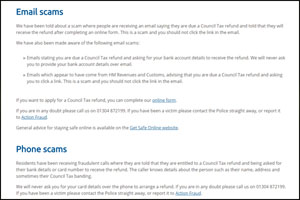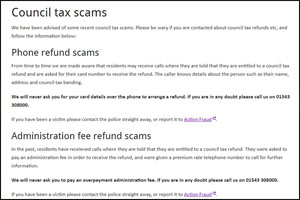Council Tax Scams
Imposters who operate from different continents or countries act swiftly and fraudulently swindle money from commoners if they provide their financial details. These professional hooligans have hands-on experience with such scams and confidently manipulate the target group until they siphon off their hard-earned money. They use sweet and attractive language to extract important information, enabling them to carry out their schemes professionally. Hundreds of innocent people in the USA have lost thousands of dollars to these well-trained scammers in the recent past, and the numbers are only expected to rise, as there are no foolproof systems in place to stop these types of online criminal activities. These scammers invade the privacy of ordinary citizens and quickly extract credit card, debit card, and other sensitive information to steal their money. Citizens living in the USA are receiving numerous fake calls, and one scam that is gaining significant momentum is the Council Tax refund scam. Scammers dial hundreds of phone numbers and inform the people who answer that they are eligible for a council tax refund. They then request credit card or bank account numbers, along with PINs and passwords, supposedly to deposit the refund. If innocent individuals provide this information, the scammers loot the money immediately and disappear without a trace.
Council Tax scams involve deceptive practices where fraudsters impersonate government officials or agencies responsible for collecting local taxes. They target individuals or businesses, attempting to extract money or personal information under false pretenses. Common Council Tax scams include fake phone calls or emails claiming that the victim owes additional taxes or is entitled to a refund. The scammers may use threatening language, such as suggesting legal action or fines, to create a sense of urgency. They may also request sensitive information like bank details or credit card numbers. In some cases, fraudsters may even offer to handle the tax payment on the victim's behalf for a fee, diverting the money for their own gain. To protect against Council Tax scams, individuals should verify the authenticity of any communication regarding tax matters, never disclose personal or financial information to unsolicited contacts, and contact the relevant local authorities directly to confirm any outstanding payments or refunds. Reporting suspected scams to the appropriate authorities is essential in preventing further victimization.


Public cannot recover even a penny from these types of criminals since they will change their identities immediately after looting the money. Victims who have lost money to these imposters should immediately inform the police and concerned authorities. Scammers may also pose as government representatives and visit people at their doorsteps. They will introduce themselves as VAOs or local government officials and claim they can assist in reducing the council tax, provided the victim pays a small commission for processing the file.
Never share any of your financial or personal information with such individuals, as they may be scammers. Note that genuine government officials will never visit homes directly to extract financial information from citizens. You can verify all tax-related information on official government websites, where the exact tax details are clearly outlined. Never fall prey to their words and lose your money.
If you feel you have been a victim of council tax refund scams, approach the concerned local bodies immediately. Government officials will support and guide you in such situations.
Some important points that citizens living in America should follow are:
-
Never share your personal and financial information with anyone, as this data is extremely sensitive.
-
Do not allow anyone inside your home without checking their identification card. The card must bear a government seal and photo.
-
There are no provisions under the constitution to reduce any form of government taxes or recoveries. If anyone claims to have the power to reduce taxes, do not believe them—they may be scammers. Only the local VAO can assist you in case of any issues with tax calculation.
Council tax scams involve deceptive tactics where fraudsters impersonate local authorities or government agencies to trick individuals or businesses into making payments or revealing sensitive information. These scams target people who are responsible for paying council tax in the UK. Here are common characteristics of council tax scams:
-
Impersonation of Officials: Scammers pose as council tax officials, claiming to be from local government authorities or agencies. They may use official-sounding names and titles to appear legitimate.
-
Threats and Pressure Tactics: Victims are often pressured with threats of legal action, fines, or even arrest if they fail to make immediate payments or provide personal information.
-
Fake Notices and Documents: Scammers may send fake council tax bills, official-looking letters, or emails that contain false information about outstanding payments.
-
Requests for Sensitive Information: Fraudsters may ask for personal or financial details, such as bank account information or credit card numbers, under the guise of verifying identity or facilitating payments.
-
Demand for Unusual Payment Methods: Scammers may insist on unconventional payment methods, such as gift cards, cryptocurrency, or wire transfers, which are not standard for legitimate council tax payments.
-
Spoofing and Fake Websites: They may use technology to manipulate caller IDs or create fake websites that mimic official government sites, further convincing victims of their authenticity.
-
Unsolicited Contact: Victims often receive unsolicited phone calls, emails, or letters regarding council tax payments, without having initiated any contact themselves.




